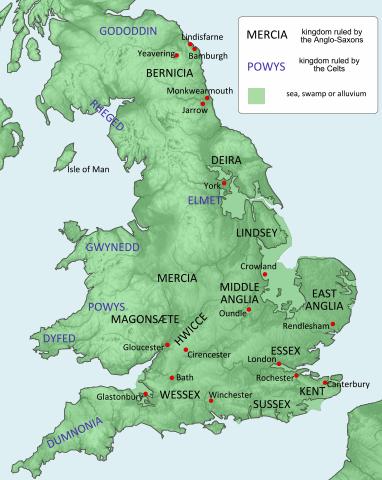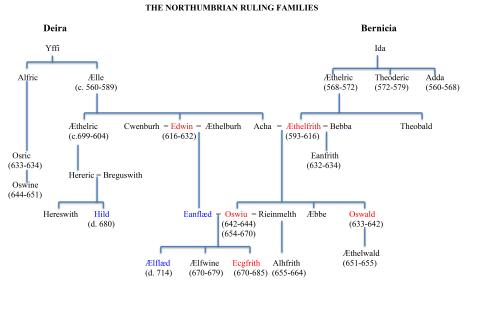<Dē vītā et obitū Hildae abbātissae>
[1] Annō post hunc sequente, hoc est annō dominicae incarnātiōnis DCLXXX, religiōsissima Chrīstī famula Hild, abbātissa monastēriī quod dīcitur Streanæshalch, ut suprā rettulimus, post multa quae fēcit in terrīs opera caelestia, ad percipienda praemia vītae caelestis dē terrīs ablāta trānsīvit diē XV kalendārum Decembrium, cum esset annōrum LXVI; quibus aequā partiōne dīvīsīs, XXXIII prīmōs in saeculārī habitū nōbilissimē conversāta complēvit, et totidem sequentēs nōbilius in monachicā vītā Dominō cōnsecrāvit. [2] Nam et nōbilis nātū erat, hoc est fīlia nepōtis Edvīnī rēgis, vocābulō Hererīcī, cum quō etiam rēge ad praedicātiōnem beātae memoriae Paulīnī prīmī Nordanhymbrōrum episcopī fidem et sacrāmenta Chrīstī suscēpit atque haec usquedum ad eius vīsiōnem pervenīre meruit, intemerāta servāvit.
[3] Quae cum relictō habitū saeculārī illī sōlī servīre dēcrēvisset, sēcessit ad prōvinciam Orientālium Anglōrum (erat namque propinqua rēgis illīus), dēsīderāns exinde, sī quō modō posset, dērelictā patriā et omnibus quaecumque habuerat, Galliam pervenīre atque in monastēriō Calē peregrīnam prō Dominō vītam dūcere, quō facilius perpetuam in caelīs patriam posset merērī. [4] Nam et in eōdem monastēriō soror ipsīus Heresvid, māter Aldvulfī rēgis Orientālium Anglōrum, rēgulāribus subdita disciplīnīs, ipsō tempore corōnam expectābat aeternam; cuius aemulāta exemplum, et ipsa prōpositō peregrīnandī annum tōtum in praefātā prōvinciā retenta est; deinde ab Aidānō episcopō patriam revocāta, accēpit locum ūnīus familiae ad septentriōnālem plāgam Viurī flūminis, ubi aequē annō ūnō monachicam cum perpaucīs sociīs vītam agēbat.
[5] Post haec facta est abbātissa in monastēriō quod vocātur Heruteu, quod vidēlicet monastērium factum erat nōn multō ante ā religiōsā Chrīstī famulā Heiu, quae prīma fēminārum fertur in prōvinciā Nordanhymbrōrum prōpositum vestemque sānctimōniālis habitūs, cōnsecrante Aidānō episcopō, suscēpisse. [6] Sed illa post nōn multum tempus factī monastēriī sēcessit ad cīvitātem Calcāriam, quae ā gente Anglōrum Kælcacaestir appellātur, ibique sibi mānsiōnem īnstituit. [7] Praelāta autem regiminī monastēriī illīus famula Chrīstī Hild, mox hoc rēgulārī vītā per omnia, prout ā doctīs virīs discere poterat, ōrdināre cūrābat, nam et episcopus Aidan et quīque nōverant eam religiōsī, prō īnsitā eī sapientiā et amōre dīvīnī famulātūs, sēdulō eam vīsitāre, obnīxē amāre, dīligenter ērudīre solēbant.
[8] Cum ergō aliquot annōs huic monastēriō rēgulāris vītae īnstitūtiōnī multum intenta praeesset, contigit eam suscipere etiam cōnstruendum sīve ōrdinandum monastērium in locō quī vocātur Streanaeshalch, quod opus sibi iniūnctum nōn sēgniter immplēvit. [9] Nam eīsdem quibus prius monastērium etiam hoc disciplīnīs vītae rēgulāris īnstituit, et quidem multam ibi quoque iūstitiae pietātis et castīmōniae cēterārumque virtūtum sed maximē pācis et cāritātis cūstōdiam docuit; ita ut in exemplum prīmitīvae ecclēsiae nūllus ibi dīves, nūllus esset egēns, omnibus essent omnia commūnia, cum nihil cuiusquam esse vidērētur proprium. [10] Tantae autem erat ipsa prūdentiae ut nōn sōlum mediocrēs, quīque in necessitātibus suīs, sed etiam rēgēs ac prīncipēs nōnnumquam ab eā cōnsilium quaererent et invenīrent. [11] Tantum lēctiōnī dīvīnārum scrīptūrārum suōs vacāre subditōs, tantum operibus iūstitiae sē exercēre faciēbat, ut facillimē vidērentur ibīdem quī ecclēsiasticum gradum, hoc est altāris officium, aptē subīrent plūrimī posse repperīrī.
[12] Dēnique quīnque ex eōdem monastēriō posteā episcopōs vīdimus, et hōs omnēs singulāris meritī ac sānctitātis virōs, quōrum haec sunt nōmina: Bosa Aetla Oftfor Iōhannēs et Vilfrid. [13] Dē prīmō suprā dīximus quod Eborācī fuerit cōnsecrātus antistes; dē secundō breviter intimandum quod in episcopātum Dorciccaestræ fuerit ōrdinātus; dē ultimīs īnfrā dīcendum est quod eōrum prīmus Hagustaldēnsis, secundus Eboracēnsis ecclēsiae sit ōrdinātus episcopus. [14] Dē mediō nunc dicāmus quia, cum in utrōque Hildae abbātissae monastēriō lēctiōnī et observātiōnī scrīptūrārum operam dedisset, tandem perfectiōra dēsīderāns vēnit Cantiam ad archiepiscopum beātae recordātiōnis Theodōrum, ubi postquam aliquamdiū lēctiōnibus sacrīs vacāvit, etiam Rōmam adīre cūrāvit, quod eō tempore magnae virtūtis aestimābātur; et inde cum rediēns Brittāniam adīsset, dīvertit ad prōvinciam Huicciōrum, cui tunc rēx Osric praefuit, ibique verbum fideī praedicāns simul et exemplum vīvendī sēsē videntibus atque audientibus exhibēns, multō tempore mānsit. [15] Quō tempore antistes prōvinciae illīus, vocābulō Bosēl, tantā erat corporis īnfirmitāte dēpressus, ut officium episcopātūs per sē implēre nōn posset, propter quod omnium iūdiciō praefātus vir in episcopātum prō eō ēlēctus ac (iubente Aedilredō rēge) per Vilfridum beātae memoriae antistitem, quī tunc temporis Mediterrāneōrum Anglōrum episcopātum gerēbat, ōrdinātus est, prō eō quod archiepiscopus Theodōrus iam dēfūnctus erat, et necdum alius prō eō ōrdinātus episcopus. [16] In quam vidēlicet prōvinciam paulō ante, hoc est ante praefātum virum Deī Boselum, vir strēnuissimus ac doctissimus atque excellentis ingeniī vocābulō Tatfrid, dē eiusdem abbātissae monastēriō ēlēctus est antistes; sed, priusquam ōrdinārī posset, morte inmātūrā praereptus est.
[17] Nōn sōlum ergō praefāta Chrīstī ancilla et abbātissa Hild, quam omnēs quī nōverant ob īnsigne pietātis et grātiae mātrem vocāre cōnsuērant, in suō monastēriō vītae exemplō praesentibus extitit, sed etiam plūrimīs longē manentibus, ad quōs fēlīx industriae ac virtūtis eius rūmor pervēnit, occāsiōnem salūtis et corrēctiōnis ministrāvit. [18] Oportēbat namque implērī somnium, quod māter eius Bregusvid in īnfantiā eius vīdit. [19] Quae cum vir eius Hereric exulāret sub rēge Brettonum Cerdice (ubi et venēnō periit), vīdit per somnium, quasi subitō sublātum eum quaesierit cum omnī dīligentiā, nūllumque eius uspiam vestīgium appāruerit. [20] Vērum cum solertissīmē illum quaesierit, extemplō sē repperīre sub veste suā monīle pretiōsissimum, quod, dum attentius cōnsīderāret, tantī fulgōre lūminis refulgēre vidēbātur, ut omnēs Brittāniae fīnēs illīus grātia splendōris implēret. [21] Quod nīmīrum somnium vērāciter in fīliā eius, dē quā loquimur, explētum est, cuius vīta nōn sibi sōlummodo sed multīs bene vīvere volentibus exempla operum lūcis praebuit.
[22] Vērum illa cum multīs annīs huic monastēriō praeesset, placuit piō prōvīsōrī salūtis nostrae sānctam eius animam longā etiam īnfirmitāte carnis exāminārī, ut iuxtā exemplum apostolī, virtūs eius in īnfirmitāte perficerētur. [23] Percussa etenim febribus ācrī coepit ārdōre fatīgārī, et per sex continuōs annōs eādem molestiā labōrāre nōn cessābat; in quō tōtō tempore numquam ipsa vel conditōrī suō grātiās agere vel commissum sibi gregem et publīcē et prīvātim docēre praetermittēbat. [24] Nam suō praedocta exemplō monēbat omnēs, et in salūte acceptā corporis Dominō obtemperanter serviendum, et in adversīs rērum sīve īnfirmitātibus membrōrum fidēliter Dominō esse grātiās semper agendās. [25] septimō ergō suae īnfirmitātis annō, conversō ad interānea dolōre, ad diem pervēnit ultimum; et circā gallī cantum perceptō viāticō sacrōsānctae commūniōnis, cum arcessītīs ancellīs Chrīstī, quae erant in eōdem monastēriō, dē servandā eās invicem, immō cum omnibus pāce ēvangelicā ammōnēret, inter verba exhortātiōnis laeta mortem vīdit; immō, ut verbīs Dominī loquar, dē morte trānsīvit ad vītam.
[26] Quā vidēlicet nocte Dominus omnipotēns obitum ipsīus in aliō longius positō monastēriō, quod ipsa eōdem annō cōnstrūxerat, et appellātur Hacanos, manifēstā vīsiōne revēlāre dignātus est. [27] Erat in ipsō monastēriō quaedam sānctimōniālis fēmina, nōmine Begu, quae XXX et amplius annōs dēdicātā Dominō virginitāte in monachicā conversātiōne serviēbat. [28] Haec tunc in dormitoriō sorōrum pausāns audīvit subitō in āere nōtum campānae sonum, quō ad ōrātiōnēs excitārī vel convocārī solēbant, cum quis eōrum dē saeculō fuisset ēvocātus; apertīsque, ut sibi vidēbātur, oculīs aspexit, dētēctō domūs culmine, fūsam dēsuper lūcem omnia replēvisse; cui vidēlicet lūcī dum sollicita intenderet, vīdit animam praefātae Deī famulae in ipsā lūce, comitantibus ac dūcentibus angelīs, ad caelum ferrī. [29] Cumque somnō excussa vidēret cēterās pausantēs circā sē sorōrēs, intellēxit vel in somniō vel in vīsiōne mentis ostēnsum sibi esse quod vīderat. [30] Statimque exsurgēns, nimiō timōre perterrita, cucurrit ad virginem, quae tunc monastēriō abbātissae vice praefuit, cui nōmen erat Frigyd, flētūque ac lacrimīs multum perfūsa ac suspīria longa trahēns, nūntiāvit mātrem illārum omnium Hild abbātissam iam migrāsse dē saeculō, et sē aspectante cum lūce inmēnsā ducibus angelīs ad aeternae līmina lūcis et supernōrum cōnsortia cīvium ascendisse. [31] Quod cum illa audīsset, suscitāvit cūnctās sorōrēs, et in ecclēsiam convocātās ōrātiōnibus ac psalmīs prō animā mātris operam dare monuit. [32] Quod cum residuō noctis tempore dīligenter agerent, vēnērunt prīmō dīlūculō frātrēs quī eius obitum nūntiārent, ā locō ubi dēfūncta est. [33] At illae respondentēs dīxērunt sē prius eadem cognōvisse; et cum expōnerent per ōrdinem quōmodo haec vel quandō didicissent, inventum est eādem hōrā trānsitum eius illīs ostēnsum esse per vīsiōnem, quā illam referēbant exīsse dē mundō. [34] Pulchrāque rērum concordiā prōcūrātum est dīvīnitus ut, cum illī exitum eius dē hāc vītā vidērent, tunc istī introitum eius in perpetuam animārum vītam cognōscerent. [35] Distant autem inter sē monastēria haec XIII fermē mīlibus passuum.
[36] Ferunt autem quod eādem nocte in ipsō quoque monastēriō, ubi praefāta Deī famula obiit, cuidam virginum Deō dēvōtārum, quae illam inmēnsō amōre dīligēbat, obitus illīus in vīsiōne appāruerit; quae animam eius cum angelīs ad caelum īre cōnspexerit, atque hoc ipsā quā factum est hōrā hīs quae sēcum erant famulīs Chrīstī manifēstē nārrāverit, eāsque ad ōrandum prō animā eius, etiam priusquam cētera congregātiō eius obitum cognōvisset, excitāverit. [37] Quod ita fuisse factum mox congregātiōnī māne factō innōtuit. [38] Erat enim haec ipsā hōrā cum aliīs nōnnūllīs Chrīstī ancellīs in extrēmīs monastēriī locīs seorsum posita, ubi nūper venientēs ad conversātiōnem fēminae solēbant probārī, dōnec rēgulāriter īnstitūtae in societātem congregātiōnis susciperentur.


